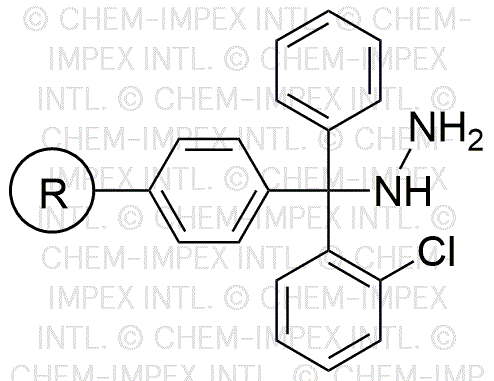Hydrazine 2-chlorotrityl resin (0.3 - 1.2 mmol/g, 200 - 400 mesh) is widely utilized in research focused on:
- Solid-Phase Peptide Synthesis: This resin is essential for synthesizing peptides in a solid-phase format, allowing researchers to create complex peptides efficiently and with high purity.
- Drug Discovery: It serves as a key component in the development of new pharmaceuticals, enabling the attachment of various drug-like molecules for screening and optimization.
- Bioconjugation: The resin is used in bioconjugation processes, facilitating the attachment of biomolecules such as proteins and antibodies to surfaces or other molecules, which is crucial in diagnostics and therapeutic applications.
- Environmental Applications: It can be employed in environmental chemistry for the removal of pollutants, acting as a support for catalysts that help in the degradation of harmful substances.
- Material Science: The resin is also applied in the development of advanced materials, providing a platform for functionalizing surfaces with specific chemical properties for various industrial applications.
General Information
Properties
Safety and Regulations
Applications
Hydrazine 2-chlorotrityl resin (0.3 - 1.2 mmol/g, 200 - 400 mesh) is widely utilized in research focused on:
- Solid-Phase Peptide Synthesis: This resin is essential for synthesizing peptides in a solid-phase format, allowing researchers to create complex peptides efficiently and with high purity.
- Drug Discovery: It serves as a key component in the development of new pharmaceuticals, enabling the attachment of various drug-like molecules for screening and optimization.
- Bioconjugation: The resin is used in bioconjugation processes, facilitating the attachment of biomolecules such as proteins and antibodies to surfaces or other molecules, which is crucial in diagnostics and therapeutic applications.
- Environmental Applications: It can be employed in environmental chemistry for the removal of pollutants, acting as a support for catalysts that help in the degradation of harmful substances.
- Material Science: The resin is also applied in the development of advanced materials, providing a platform for functionalizing surfaces with specific chemical properties for various industrial applications.
Documents
Safety Data Sheets (SDS)
The SDS provides comprehensive safety information on handling, storage, and disposal of the product.
Product Specification (PS)
The PS provides a comprehensive breakdown of the product’s properties, including chemical composition, physical state, purity, and storage requirements. It also details acceptable quality ranges and the product's intended applications.
Certificates of Analysis (COA)
Search for Certificates of Analysis (COA) by entering the products Lot Number. Lot and Batch Numbers can be found on a product’s label following the words ‘Lot’ or ‘Batch’.
*Catalog Number
*Lot Number
Certificates Of Origin (COO)
This COO confirms the country where the product was manufactured, and also details the materials and components used in it and whether it is derived from natural, synthetic, or other specific sources. This certificate may be required for customs, trade, and regulatory compliance.
*Catalog Number
*Lot Number
Safety Data Sheets (SDS)
The SDS provides comprehensive safety information on handling, storage, and disposal of the product.
DownloadProduct Specification (PS)
The PS provides a comprehensive breakdown of the product’s properties, including chemical composition, physical state, purity, and storage requirements. It also details acceptable quality ranges and the product's intended applications.
DownloadCertificates of Analysis (COA)
Search for Certificates of Analysis (COA) by entering the products Lot Number. Lot and Batch Numbers can be found on a product’s label following the words ‘Lot’ or ‘Batch’.
*Catalog Number
*Lot Number
Certificates Of Origin (COO)
This COO confirms the country where the product was manufactured, and also details the materials and components used in it and whether it is derived from natural, synthetic, or other specific sources. This certificate may be required for customs, trade, and regulatory compliance.


